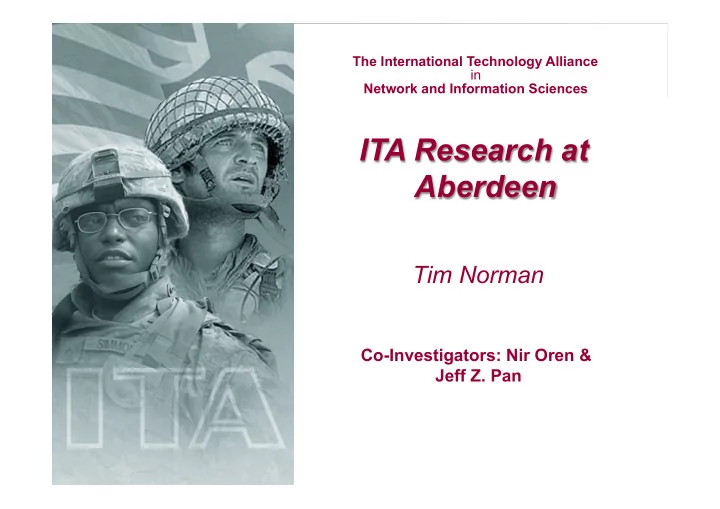

The International Technology Alliance in Network and Information Sciences ITA Research at Aberdeen Tim Norman Co-Investigators: Nir Oren & Jeff Z. Pan
ITA Project Overview § 2006-2016, US DoD/UK MoD, led by IBM, ~$115M § White House press release, March 2012: “Since 2006, an International Technology Alliance of industrial and academic organizations from the U.S. and UK, led by U.S. Army Research Laboratory and UK Defense Science and Technology Laboratory, have been jointly conducting collaborative research to enhance information-sharing and distributed, secure, and flexible decision-making to improve networked coalition operations.” § Key partners for Aberdeen: Cardiff, CMU, CUNY, UCLA, Boeing, IBM (US & UK). 24 partners in total. § Supported 7 PhDs so far; 2 to start soon. 1 RF.
Trust Assessment and Decision Making Chris Burnett (PhD) (now TRUMP RF) § Trust and reputation are crucial concepts in open, dynamic systems § Problem: How to reliably support trust assessment of services/information sources? § Solution: Exploit feature-behavior correlations to 'bootstrap' trust assessment Effect of stereotyping on existing models Burnett et al. “ Bootstrapping Trust Assessment Through Stereotypes ” , AAMAS-2010; “Trust decision-making in multi-agent systems”, IJCAI 2011; “ Stereotypical Trust and Bias in Dynamic Multi-Agent Systems ” , ACM-TIST.
Team, Behaviour and Policy Recognition Daniele Masato (PhD) (now Qualcomm) § Surveillance and task-aware decision-support require knowledge of what individuals/groups are doing Ø Problem: How to recognise teams and their activity? Ø Solution: Use of linear conditional random fields for incremental team & activity recognition from position traces Masato et al. “Agent-oriented incremental team and activity recognition”, IJCAI 2011 • David Emele (PhD) (now dot.rural RF) § Influencing others behaviour requires knowledge of their preferences/policies Ø Problem: How to influence others from sparse evidence? Ø Solution: Learn from dialogical evidence and background knowledge to inform future strategy Emele et al. “Argumentation strategies for plan resourcing”, AAMAS 2011; “Learning • Strategies for Task Delegation in Norm-Governed Environments”, AAMAS Journal.
Reasoning as a Service Geeth De Mel (ABDN PhD) IBM internship (now ARL RF) Murat Sensoy (ABDN RF) Visiting Researcher § Need for flexible, policy-aware reasoning mechanisms in SOA § Problem : How can different policy-aware reasoning services be employed dynamically § Solution : Ontological Logic Programming & OWL-POLAR O L Pellet N2 R1 ITA Sensor SAM P Fabric N4 Portal TrOWL R4 N3 Engine N R5 Sensoy et al. “ OWL-POLAR: A framework for semantic policy representation and reasoning ” , J. Web Semantics.
Exploitation of Distributed, Uncertain and Obfuscated Information COALITION NEEDS Develop rigorous methods for decision-making § Making decisions using large volume of and reasoning with uncertain & obfuscated complex and uncertain data drawn from information from diverse distributed sources. heterogeneous and distributed sources § Sharing information and making decisions with such information across sources and consumers with varying trusts and policies § Constraints and characteristics: Distributed sources, quality of information, information Task ¡6.2 ¡ Query ¡& ¡ ¡Informa3on ¡ Presenta3on ¡of ¡ sharing policies, time to decision, semantic Retrieval ¡ Relevant ¡Informa3on ¡ gap, cognitive overload Reasoning ¡over ¡Uncertain ¡Data ¡ PROJECT FOCUS Task ¡6.1 ¡ Fusion ¡of ¡Obfuscated ¡ Trust ¡with ¡Obfuscated ¡ § Task 6.1: Balancing the need to share and Informa3on ¡ Interac3ons ¡ need to know via dynamic obfuscation and obfuscation-aware fusion § Task 6.2: Framework for discovery and representation of relevant information and reasoning to minimize information overload Hard & Soft Information Sources across Coalition
Key Technical Accomplishments Task 1: Information Fusion in Coalition Operations under Data Obfuscation and Variable Trust § Robust combination of information from hard and soft sources in a coalition that may be subjecting shared information to obfuscations, and where trust between providers and consumers of information may be variable Ø Estimating trust in the presence of obfuscation Ø Fusing information from obfuscating sources Ø Reasoning about and with obfuscated information Ø Experimental validation of dynamic obfuscation and obfuscation-aware fusion Task 2: Querying Over Distributed Coalition Data Network in Support of Decision Making § Minimization of information overload and time to decision by efficient querying, retrieval and presentation of relevant facts from the deluge of data from distributed sources Ø Framework to query & retrieve relevant facts in support of decision making Ø Framework to represent and aggregate data with uncertainty Ø Techniques to present relevant facts and answers Ø End-to-end demonstration and evaluation of the overall system 7
Science of Security: Mathematics, Economics, and Systems David Pym (CS), Matthew Collinson (CS) & Julian Williams (Econ) • TSB/RCUK Trust Economics: Modelling behaviour, systems, policy, and operations. Just finished, Final Report at http://www.abdn.ac.uk/~csc335/TE_Final_Report_collated.pdf. About £1.3M. • HP’s ‘Security Analytics’ service offering: Applies TE to Security Management. • TSB/RCUK Cloud Stewardship Economics: understanding agency and stewardship in the cloud services business context. About £1.4M. • HP’s Cloud and Security Lab: Applying CSE to major business propositions • TSB/RCUK Trust Domains: Understanding security, trust, and stewardship in the whole ecosystem: infrastructure, services, and social layers. About £1.3M. • FP7 SECONOMICS: mathematics and economics for policy analysis and design in information and physical security: CNI and transport security. About € 3M. • M. Collinson, B. Monahan, and D. Pym. A Discipline of Mathematical Systems Modelling. College Publications, 2012.
Recommend
More recommend